Allen Ezail Iverson is an American former professional basketball player who played 14 seasons in the National Basketball Association (NBA) at both the shooting guard and point guard positions.
“The fifth-greatest NBA shooting guard of all time, ”as rated by ESPN, Allen Iverson is an 11-time NBA All-Star and 2-time NBA All-Star MVP.
The 2001 NBA’s Most Valuable Player is known for prolific scoring regardless of his relatively small height and was inducted into the Basketball Hall of Fame in 2016.

The former NBA player is a 4-time NBA scoring champion and 3-time NBA steals leader and has a playoff average of 29.7 points per game.
Besides the NBA, he has also represented the national team and bagged a bronze at the 2004 Olympics, and gold at FIBA Americas Championship (2003) and Summer Universiade (1995).
You may have watched Allen play the NBA games and cheered for him for years. However, you may not know enough about his inspiring journey and outstanding accomplishments.
His life story is worth reading because of his difficult childhood and legal problems in early adulthood. So, stick with the article through to the end.
Quick Facts
| Full Name | Allen Ezail Iverson |
| Birth Date | June 7, 1975 |
| Birth Place | Hampton, Virginia, United States |
| Nickname | AI, The Answer, Ivy, The 3rd Degree |
| Religion | Christianity |
| Nationality | American |
| Ethnicity | Black |
| Education | Bethel High School
Georgetown University |
| Horoscope | Gemini |
| Father’s Name | Allen Broughton |
| Mother’s Name | Ann Iverson |
| Siblings | None |
| Age | 50 Years Old |
| Height | 6’0″/1.83 m/183 cm |
| Weight | 75 kg/165 lb. |
| Shoe Size | 11 (US) |
| Build | Athletic |
| Eye color | Dark Brown |
| Hair Color | Black |
| Profession | Basketball Player (former) |
| Position | Shooting guard/Point guard/Combo guard |
| Active years (Senior Career) | 1997-2016 (player)
2019-present (coach) |
| Teams | Philadelphia 76ers
Denver Nuggets Detroit Pistons Memphis Grizzlies Beşiktaş J.K. |
| Jersey Number | #3 Philadelphia 76ers
#1 Detroit Pistons #3 Denver Nuggets #3 Memphis Grizzlies |
| Sexual Orientation | Straight |
| Marital Status | Divorced |
| Ex-Wife | Tawanna Turner (m. 2001-2010) |
| Children | Five |
| Net Worth | $1 million |
| Salary | $1,029,794 (2010) |
| Endorsement | Reebok |
| Social Media | Facebook, Twitter, Instagram |
| Merch | Books, Signature Autographed Jersey |
| Last Update | July 2025 |
Where Is Allen Iverson From? Family And Education
Allen Iverson was born to his parents, Allen Broughton and Ann Iverson, in Hampton, Virginia, on June 7, 1975.
His parents had separated before the former NBA player was born, and Ann was just 15 when she gave birth to Allen.
Then, Ann moved to the new apartment of her new boyfriend, Michael Freeman, with her infant child.
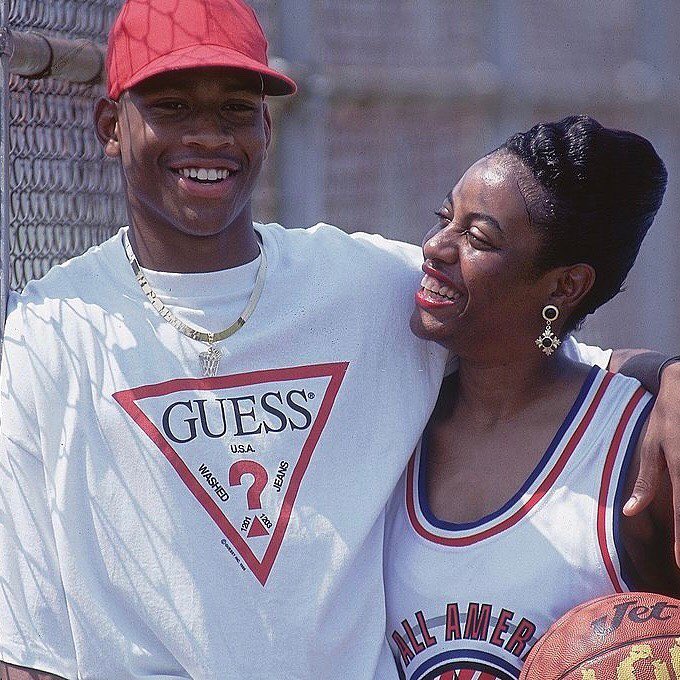
Michael, his father figure, was arrested for drug dealing when Allen was 13. Consequently, Allen’s childhood was a challenging experience, growing up without a father and dealing with poverty.
Allen enrolled at Bethel High School and played for the school’s football team as a running back, kick returner, and defensive back. He was also a point guard for the school’s basketball team.
For both sports, Allen received The Associated Press High School Player of the Year Award. Besides, he won the 1992 under-17 AAU national champions with the Boo Williams AAU basketball team.
Jail
Along with his friends, Allen was involved in a fight at a bowling alley in Hampton in 1993. The conflict soon turned out to be racial. Allen allegedly hit a woman in the head with a chair during that brawl.
Only he and his three black friends were arrested. Allen was 17 at the time. However, he had to face adult charges of maiming three people.
He expresses his thoughts on being inside the jail, “Someone sees something weak in you; they’ll exploit it. I never showed any weakness. I just kept going strong until I came out.”
Allen was a victim of racial prejudice and had to spend five years in prison. Later, his conviction was overturned by the Virginia Court of Appeals in 1995.
Career
College Career
The former shooting guard joined Georgetown University in 1994. In his first season, he was named to the All-Rookie Tournament First Team and earned the Big East Rookie of the Year award.
Also, in his second season, Allen won Big East Championship with the Hoyas and led his team to the Elite Eight round of the NCAA tournament.
He finished his collegiate career as the all-time leading average scorer with 22.9 points per game.
After his second season with the team, Iverson declared for the NBA draft, forgoing his remaining college eligibility.
Professional Career
Allen got selected with the 1st overall pick in the 1996 NBA draft by the Philadelphia 76ers.
Philadelphia 76ers
Allen was the shortest first-overall pick ever in the NBA draft and made his debut in a 103-111 loss against the Milwaukee Bucks, scoring 30 points and 6 assists.
Then, Allen faced Michael Jordan during their game against the Chicago Bulls, where he recorded 37 points.
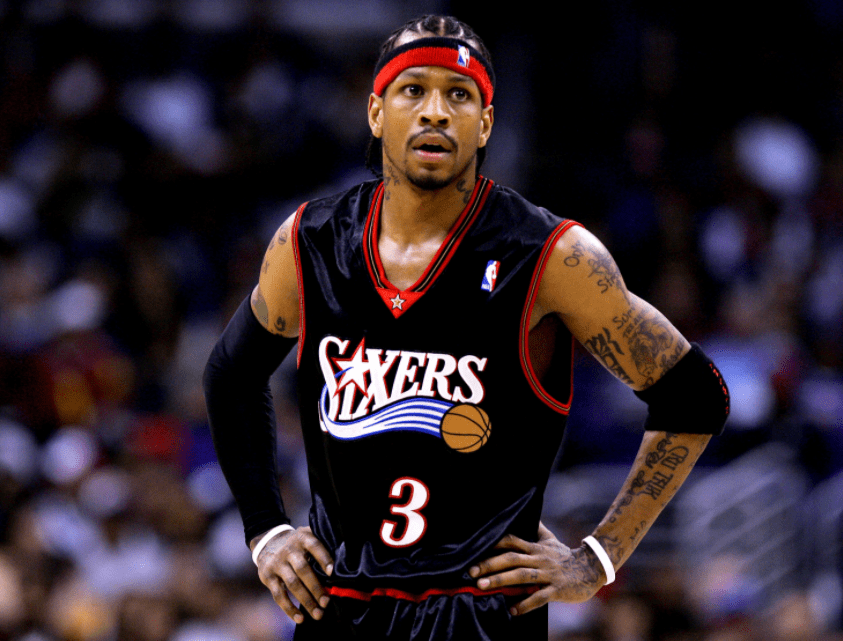
On January 26, 1999, Iverson signed a six-year/$70.9 million contract extension. In the 1998-1999 season, he averaged 28.5 points per game in ten playoff games.
Despite suffering from injuries, the former basketball player led the Sixers to a four game win over the number three-seeded Orlando Magic before facing a defeat against the Indiana Pacers in the second round.
Besides, Iverson was included in the Eastern Conference All-Star team for the first time in his career.
First NBA Finals
In the 2000-01 season, Iverson was a starter in the 2001 NBA All-Star Game and won the game MVP.
After averaging a then-career-high 31.1 points, Iverson was named NBA Most Valuable Player with the NBA scoring and steals title.
The 76ers faced Los Angeles Lakers featuring Kobe Bryant and Shaquille O’Neal, in the 2001 NBA Finals, their first finals since the 1983 championship.
Iverson scored a playoff-high 48 points for the 76ers beating the Lakers 107-101 to be the NBA champion, handing the Lakers their first playoff loss that year.
Playoff Disappointments
Injuries disrupted Allen’s 2001-02 season. However, he averaged 31.4 points playing only 60 games. As a result, the 76ers bowed out from the first round of the playoffs after a defeat to the Boston Celtics.
The next season was disappointing for the 76ers as the Detroit Pistons eliminated them in the second round of the playoffs.
The 2003-04 season started without Larry Brown, who was regarded as “the best coach in the world” by Iverson. The two later reunited when Iverson became the co-captain of the 2004 United States Olympics men’s basketball team.
With the arrival of new head coach Randy Ayers, Iverson found it hard to develop any chemistry with Ayers, and a similar response came from all the other players.
In the latter part of the 2003-04 season, Allen was suspended and fined for missing practice under interim head coach Chris Ford. That season, he missed 34 games leading the Sixers to miss the postseason for the first time since 1998.
Parting Ways With The 76ers
Again, the Sixers had a disappointing start of 5-10 in 15 games in the 2006-07 season. He reportedly demanded a trade from the Sixers but was denied. His action prevented him from playing any more games.
Denver Nuggets
In December 2006, Allen and Ivan McFarlin were traded to the Denver Nuggets for Andre Miller, Joe Smith, and two first-round picks in the 2007 NBA draft.
He made 22 points and 10 assists in his first game for the Nuggets against the Sacramento Kings.
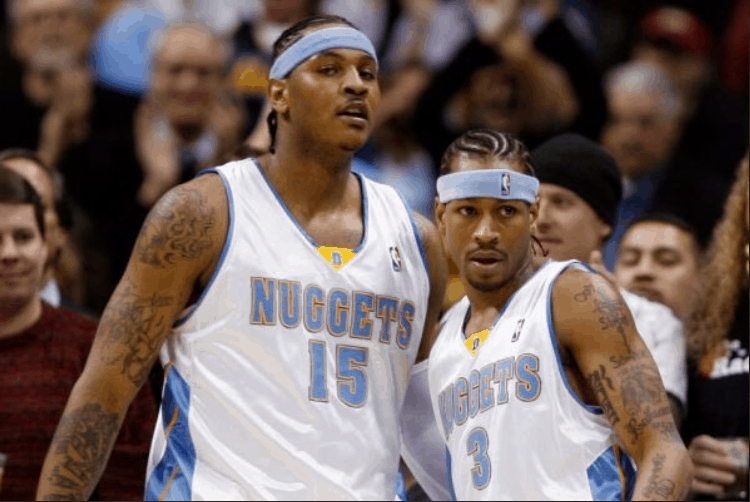
During the contest with his former team, Iverson got ejected after two technical fouls and was fined $25,000 by the NBA for criticizing referee Steve Javie.
Detroit Pistons
Allen was traded to the Detroit Pistons for Chauncey Billups, Antonia McDyess, and Cheikh Samb in November 2008.
Having worn the #3 jersey throughout his career before, he switched to #1 for the Pistons. He scored a minimum of 24 in four of his first five games for the Pistons.
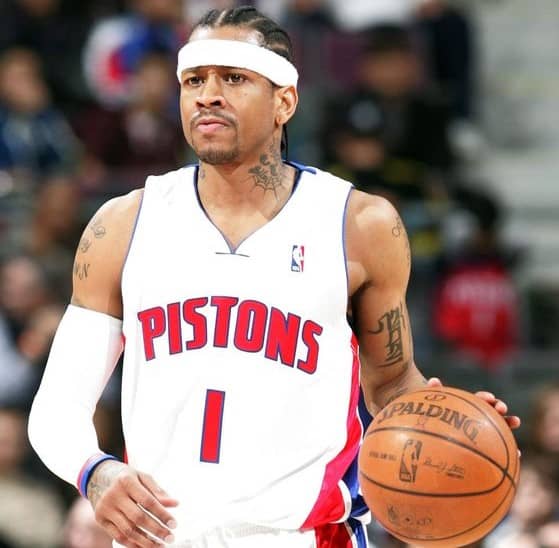
However, he did not get enough playing time there. As a result, the Pistons announced he wouldn’t play the remainder of the 2008-09 season.
Memphis Grizzlies
Allen signed for the Memphis Grizzlies on a one-year deal in September 2009. But, again, he was benched for several games at the Memphis.
He expressed displeasure at being benched and left the team on November 7, 2009, citing personal reasons.
The Grizzlies announced his contract termination by mutual agreement on November 16. During his stint with the Grizzlies, he played 3 games, averaging 12.3 PPG, 1.3 RPG, and 3.7 APG.
Return To The 76ers
After leaving the Pistons, Iverson returned to his old club, signing a one-year deal worth $1.3 million.
The home crowd cheered him on his first match after his return against the Denver Nuggets.
Allen ended the Sixers’ twelve games losing streak against the Golden State Warriors. He played his final NBA game against the Chicago Bulls on February 20, 2010, before leaving the 76ers to deal with a personal matter.
Beşiktaş And Big 3
The Turkish Super League team, Beşiktaş, announced the signing of Allen in October 2010 on a two-year/$4 million deal.
He debuted for the team in a 91-94 loss against the Serbian team, Hemofarm.
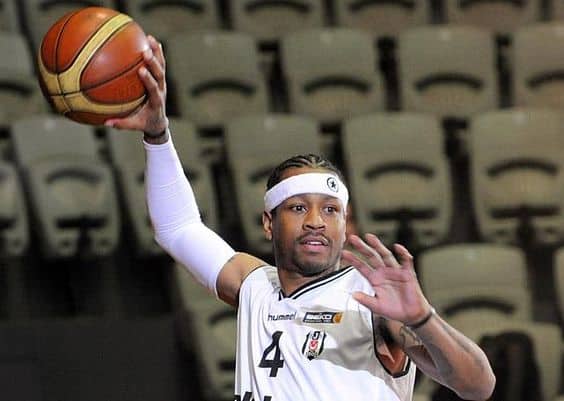
Allen played ten games for Beşiktaş and did not feature in any games after his calf surgery in January 2011.
He also served as a captain and coach for the 3’s Company in the 3-on-3 professional basketball league, BIG3. He scored 2 points in 9 minutes in his first game there.
When Did Allen Iverson Play His Last Game? Retirement
Iverson was offered to play for the Texas Legends of the NBA D League, but he declined. He officially retired from basketball on October 30, 2013, citing he had lost his desire to play.
Moreover, Iverson last played professionally in Turkey in the 2010-2011 season but left halfway through the first season.
National Career
Allen was in the 1995 USA World University Games Team with Tim Duncan and other future NBA stars. The team snatched the gold medal after a 141-81 win against the host country, Japan.
The former professional basketball player also represented the national team in the 2003 FIBA Americas Olympic Qualifying Tournament, finishing 10th in scoring, 4th in steals, and 7th in assists. However, he missed the final two matches with a sprained right thumb.
Iverson also played in the 2004 Athens Summer Olympics under the coaching of legendary coach Larry Brown.
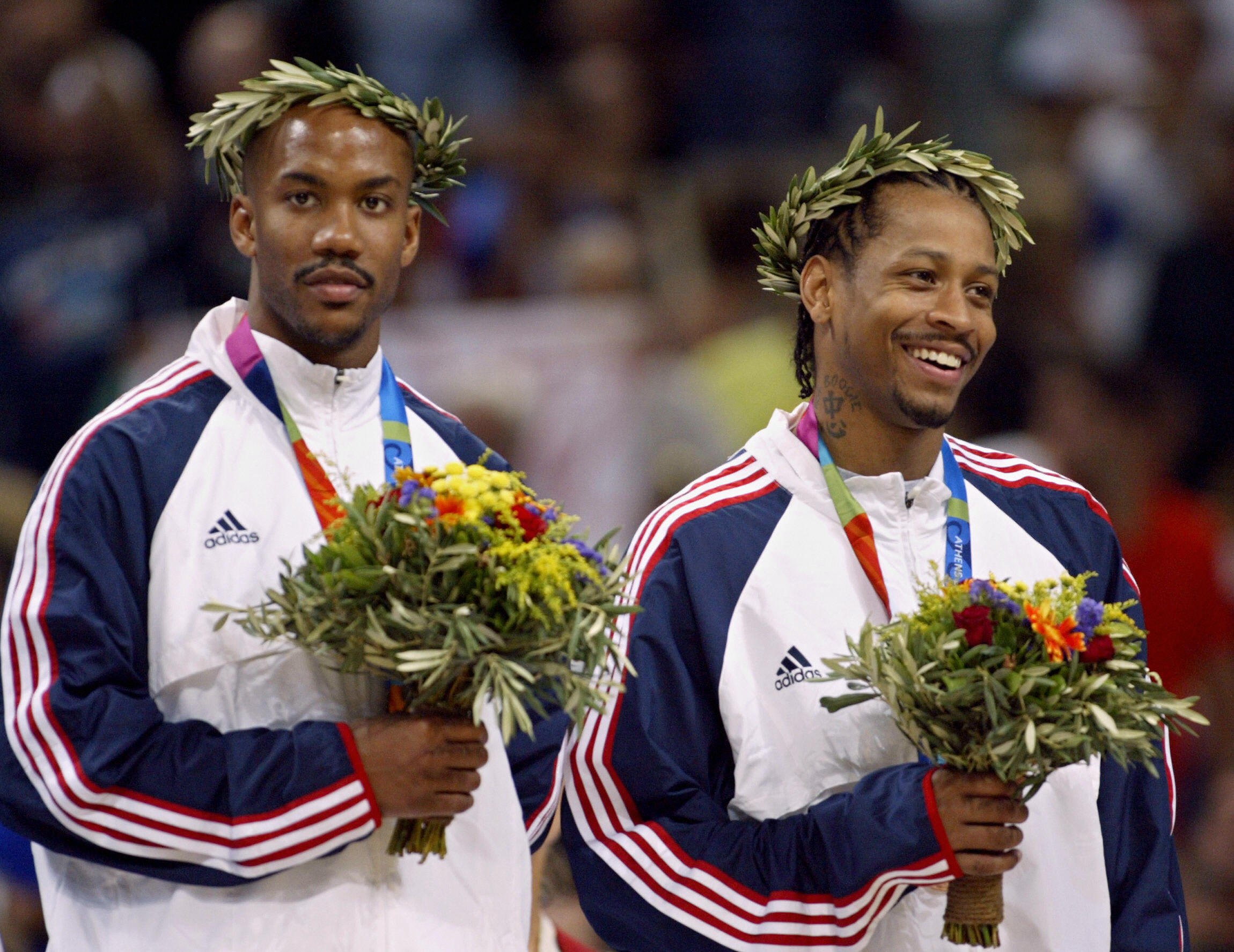
Furthermore, he was the captain of the 2004 US men’s basketball team along with Tim Duncan. The Team USA won their second Olympic bronze medal since 1988.
Besides, it was the first Olympics since 1992 that the US team had not won the gold medal. In addition, it was the worst performance of the men’s basketball team since the NBA players were allowed to play in the Olympic games.
The US team lost three games, including the opening game against Puerto Rico, where they lost by 19 points. It was the then-largest margin of defeat for the team.
Since then, Iverson has not played in any Olympic Games.
What Rule Did The NBA Change Because of Allen Iverson?
NBA changed the dress code rule because of Allen Iverson. Iverson was one of the coolest and flashiest guys to ever play in the NBA. He was one of the main reasons the NBA implemented a dress code rule.
To be precise, Allen was known for arriving at post-game interviews or games wearing street-style clothes. His hip-hop-styled, baggy clothes were considered unprofessional for the league.
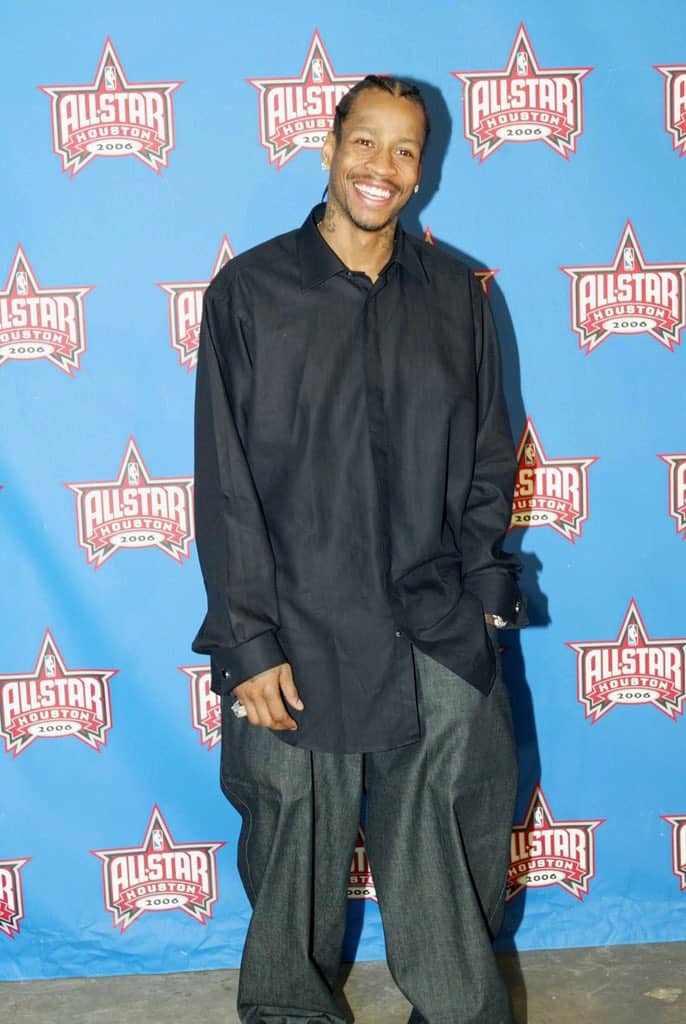
So David Stern, the then commissioner of the NBA, implemented the dress code rule in 2005. The rule stated that,
“All players must dress in business or conservative attire while arriving and departing during a scheduled game, on the bench while injured, and when conducting official NBA business (press interviews, charity events, etc.).”
Moreover, the dress code rule also banned (vintage) jerseys, sunglasses (indoor), headphones, jeans, hats, T-shirts, do-rags, sneakers, large jewelry, etc. Not to mention violations of the dress code leads to fines and suspensions.
Accolades And Achievements
- 1993: First-team Parade All-American
- 1995: Big East Rookie of the Year, Second-team All-Big East, Big East Defensive Player of the Year
- 1996: Big East Defensive Player of the Year, First-team All-Big East, Consensus first-team All-American
- 1997: NBA Rookie of the Year, NBA All-Rookie First Team
- 1999: NBA scoring champion, All-NBA First Team
- 2000: All-NBA Second Team
- 2001: NBA Most Valuable Player, NBA All-Star Game MVP, NBA scoring champion, All-NBA First Team
- 2002: NBA scoring champion, All-NBA Second Team
- 2003: All-NBA Second Team
- 2005: NBA scoring champion, NBA All-Star Game MVP, All-NBA First Team
- 2006: All-NBA Third Team
- 2000–2010: 11× NBA All-Star
- 2001–2003: 3× NBA steals leader
- 2016: Naismith Memorial Basketball Hall of Fame
Career stats
|
Year
|
Team
|
GP
|
Min
|
Pts
|
FG%
|
3pt%
|
Reb
|
Ast
|
Stl
|
Blk
|
|---|---|---|---|---|---|---|---|---|---|---|
|
2009
|
Philadelphia 76ers
|
25
|
31.9
|
13.9
|
41.7
|
33.3
|
3.0
|
4.1
|
0.7
|
0.1
|
|
2009
|
Memphis Grizzlies
|
3
|
22.3
|
12.3
|
57.7
|
100.0
|
1.3
|
3.7
|
0.3
|
0.0
|
|
2008
|
Detroit Pistons
|
54
|
36.5
|
17.4
|
41.6
|
28.6
|
3.1
|
4.9
|
1.6
|
0.1
|
|
2008
|
Denver Nuggets
|
3
|
41.0
|
18.7
|
45.0
|
25.0
|
2.7
|
6.7
|
1.0
|
0.3
|
|
2007
|
Denver Nuggets
|
82
|
41.8
|
26.4
|
45.8
|
34.5
|
3.0
|
7.1
|
2.0
|
0.1
|
|
2006
|
Denver Nuggets
|
50
|
42.4
|
24.8
|
45.4
|
34.7
|
3.0
|
7.2
|
1.8
|
0.2
|
|
2006
|
Philadelphia 76ers
|
15
|
42.7
|
31.2
|
41.3
|
22.6
|
2.7
|
7.3
|
2.2
|
0.1
|
|
2005
|
Philadelphia 76ers
|
72
|
43.1
|
33.0
|
44.7
|
32.3
|
3.2
|
7.4
|
1.9
|
0.1
|
|
2004
|
Philadelphia 76ers
|
75
|
42.3
|
30.7
|
42.4
|
30.8
|
4.0
|
7.9
|
2.4
|
0.1
|
|
2003
|
Philadelphia 76ers
|
48
|
42.5
|
26.4
|
38.7
|
28.6
|
3.7
|
6.8
|
2.4
|
0.1
|
|
2002
|
Philadelphia 76ers
|
82
|
42.5
|
27.6
|
41.4
|
27.7
|
4.2
|
5.5
|
2.7
|
0.2
|
|
2001
|
Philadelphia 76ers
|
60
|
43.7
|
31.4
|
39.8
|
29.1
|
4.5
|
5.5
|
2.8
|
0.2
|
|
2000
|
Philadelphia 76ers
|
71
|
42.0
|
31.1
|
42.0
|
32.0
|
3.8
|
4.6
|
2.5
|
0.3
|
|
1999
|
Philadelphia 76ers
|
70
|
40.8
|
28.4
|
42.1
|
34.1
|
3.8
|
4.7
|
2.1
|
0.1
|
|
1999
|
Philadelphia 76ers
|
48
|
41.5
|
26.8
|
41.2
|
29.1
|
4.9
|
4.6
|
2.3
|
0.1
|
|
1997
|
Philadelphia 76ers
|
80
|
39.4
|
22.0
|
46.1
|
29.8
|
3.7
|
6.2
|
2.2
|
0.3
|
|
1996
|
Philadelphia 76ers
|
76
|
40.1
|
23.5
|
41.6
|
34.1
|
4.1
|
7.5
|
2.1
|
0.3
|
|
Career
|
|
914
|
41.1
|
26.7
|
42.5
|
31.3
|
3.7
|
6.2
|
2.2
|
0.2
|
How Many Kids Does Allen Iverson Have? Wife And Children
Allen was married to his high school sweetheart Tawanna Turner in 2001. They shared vows in the presence of their loved ones at The Mansion on Main Street in Voorhees, New Jersey.
The former couple started dating in high school when they were 16. They have five children; Tiaura, Allen II, Isaish, Messiah, and Dream.
However, the pair are no longer together. Tawanna Iverson filed for divorce on March 2, 2010, seeking custody of their children, as well as child support and alimony payments.
Their divorce was settled in 2013, but they were back together less than a month after their settlement, per Allen.
Net Worth And Salary
Allen made about $154 million from his professional NBA career. Moreover, his total income during his entire career is reported to be $200 million, including his other ventures, endorsement deals, and sponsorships.
However, he has lost almost all of his earnings due to his high spending habits and legal fees.
Allen Iverson’s net worth IS estimated to be around $1 million as of 2025.
Allen was once among the highest-paid athletes who earned more than $20 million a season in the 2008-09 season with the Pistons.
He has a lifetime contract with Reebok that pays him $800k a year and ensures him $32 million when he turns 55.
But being relatively poor in terms of net worth, it is speculated that he has millions of dollars in the bank.
Films
Iverson appeared as himself in the movies Like Mike (2002) and Imagine That (2009) and as Stephon Marbury’s friend in the 2017 film My Other Home.
Social Media Presence
Allen primarily uses Facebook, Twitter, and Instagram as his social media handles. He frequently updates his fan using his social handles.
You can find him on Instagram under the handle @theofficialai3, on Twitter @alleniverson, and on Facebook with the name Allen Iverson.
Facebook: 4.8m followers
Twitter: 1.3m followers
Instagram: 13.3m followers
Popularity
Creating a blueprint for the modern sports superstar and forcing the NBA to amend their rules, Allen Iverson has found himself making the headlines.
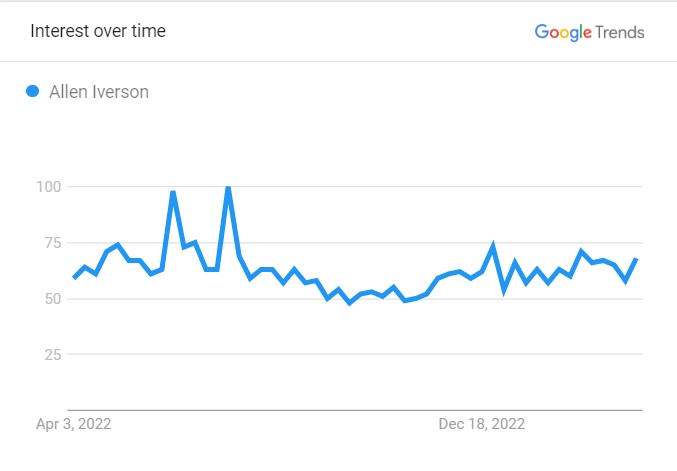
The above image illustrates the fluctuating popularity of Allen Iverson based on Google searches in the United States over a year.
Frequently Asked Questions (FAQs)
Allen Iverson gained the name “The Answer” as he turned out to answer all the questions to the 76ers regarding their success in the NBA. Before he signed for the 76ers, they had consecutive worse seasons with no superstars. But Iverson led them to the NBA Finals and returned glory days to the team.
Despite earning many fortunes in his career as one of the highest-paid athletes, Allen Iverson is considered to be broke nowadays. The reason is his expensive style of living and loss of money in different legal issues.
Allen Iverson and Kobe Bryant were two of the fiercest competitors. They both were drafted in 1996 and were the best players in the league. Likewise, every time Iverson faced Kobe, it would be fireworks. However, this was only on-court, and they were best friends off-court. After Kobe's death, Allen broke down in tears and was heartbroken and devastated. He also shared multiple posts on his social media handles about Kobe's death, saying, “It still doesn't seem real. Of course, he was younger than me, but still, I always looked up to him and his greatness.”
Allen Iverson had a defense rating of 105.5 in his career.
Allen recorded a rap single, “40 Bars”. But he could not release the song as it contained controversial lyrics. Many allegations from different activist groups halted its release.
Allen Iverson had a player efficiency rating of 20.92. Why is Allen Iverson called “The Answer?”
Why is Allen Iverson poor?
Were Allen Iverson and Kobe Bryant friends?
What was Allen Iverson's defense rate?
Did Allen Iverson release a song?
What is Allen Iverson's player efficiency rating?
